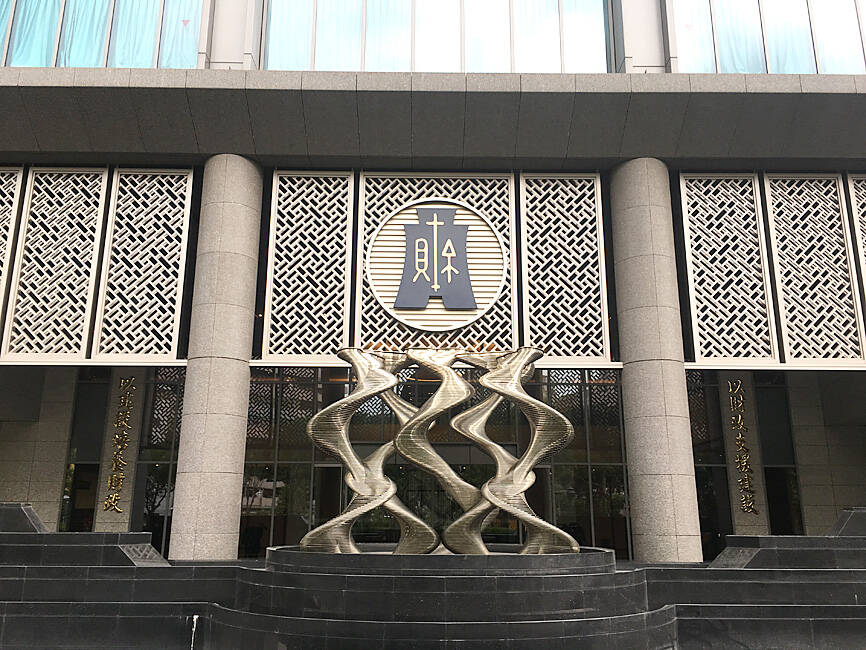Taiwan’s tax revenue as a percentage of GDP was 14.7 percent last year, a 0.1 percentage point increase from the previous year and the highest in 26 years, the Ministry of Finance said on Friday.
The tax-to-GDP ratio gauges the proportion of a nation’s total output collected by the government through taxation and indicates the degree to which a government controls resources.
Taiwan’s ratio has hovered between 11 and 14 percent since 2000, after reaching an average of 16.5 percent from the 1980s to the 1990s, ministry data showed.

Photo: Clare Cheng, Taipei Times
Last year’s figure surpassed Singapore’s 13.7 percent, but was lower than the US’ 19.1 percent, South Korea’s 20.4 percent and Japan’s 21.2 percent, the ministry said in a report, adding that the figure ranges from 20 percent to 44 percent for European countries.
The average tax burden per capita last year was estimated at NT$159,348 (US$4,876), a NT$11,478 increase from the previous year and a new record high, it said.
Boosted by stable economic growth, wage increases and rising stock market turnover, total tax revenues collected last year were NT$3.73 trillion, a record high, and exceeded the government’s budgeted amount by NT$497.2 billion, the ministry said.
Including social security contributions, tax-to-GDP ratio stood at 20.5 percent last year, still lower than the US’ 25.2 percent, South Korea’s 28.9 percent, Japan’s 34.4 percent, Germany’s 38.1 percent and France’s 43.8 percent, it said.
Social security contributions, including labor and health insurance, have continued to rise in the past few years to comply with global trends. It reached NT$1.39 trillion last year, an increase of NT$37.3 billion, or 2.8 percent, compared with 2023, the ministry said.
From 2013 to 2023, the tax-to-GDP ratio including social security contributions had increased in 14 of the 20 major countries, and the average growth of 2.3 percent in Taiwan over that period was a mild increase compared with others, it said.

Taiwan Semiconductor Manufacturing Co (TSMC, 台積電) last week recorded an increase in the number of shareholders to the highest in almost eight months, despite its share price falling 3.38 percent from the previous week, Taiwan Stock Exchange data released on Saturday showed. As of Friday, TSMC had 1.88 million shareholders, the most since the week of April 25 and an increase of 31,870 from the previous week, the data showed. The number of shareholders jumped despite a drop of NT$50 (US$1.59), or 3.38 percent, in TSMC’s share price from a week earlier to NT$1,430, as investors took profits from their earlier gains

In a high-security Shenzhen laboratory, Chinese scientists have built what Washington has spent years trying to prevent: a prototype of a machine capable of producing the cutting-edge semiconductor chips that power artificial intelligence (AI), smartphones and weapons central to Western military dominance, Reuters has learned. Completed early this year and undergoing testing, the prototype fills nearly an entire factory floor. It was built by a team of former engineers from Dutch semiconductor giant ASML who reverse-engineered the company’s extreme ultraviolet lithography (EUV) machines, according to two people with knowledge of the project. EUV machines sit at the heart of a technological Cold

Taiwan’s long-term economic competitiveness will hinge not only on national champions like Taiwan Semiconductor Manufacturing Co. (TSMC, 台積電) but also on the widespread adoption of artificial intelligence (AI) and other emerging technologies, a US-based scholar has said. At a lecture in Taipei on Tuesday, Jeffrey Ding, assistant professor of political science at the George Washington University and author of "Technology and the Rise of Great Powers," argued that historical experience shows that general-purpose technologies (GPTs) — such as electricity, computers and now AI — shape long-term economic advantages through their diffusion across the broader economy. "What really matters is not who pioneers

TAIWAN VALUE CHAIN: Foxtron is to fully own Luxgen following the transaction and it plans to launch a new electric model, the Foxtron Bria, in Taiwan next year Yulon Motor Co (裕隆汽車) yesterday said that its board of directors approved the disposal of its electric vehicle (EV) unit, Luxgen Motor Co (納智捷汽車), to Foxtron Vehicle Technologies Co (鴻華先進) for NT$787.6 million (US$24.98 million). Foxtron, a half-half joint venture between Yulon affiliate Hua-Chuang Automobile Information Technical Center Co (華創車電) and Hon Hai Precision Industry Co (鴻海精密), expects to wrap up the deal in the first quarter of next year. Foxtron would fully own Luxgen following the transaction, including five car distributing companies, outlets and all employees. The deal is subject to the approval of the Fair Trade Commission, Foxtron said. “Foxtron will be